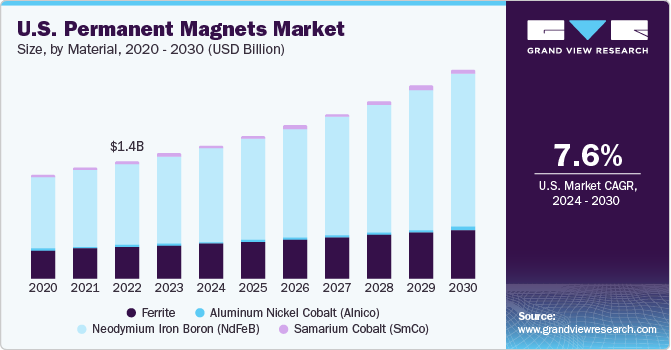Permanent Magnets Market Size, Share, Growth, Trends and Forecast 2030
The global permanent magnets market size is projected to reach approximately USD 39.70 billion by 2030, according to a new report by Grand View Research, Inc., expanding at a CAGR of 8.4% over the forecast period. The rising number of supportive initiatives to promote healthcare infrastructure, especially in developing countries, is projected to aid the market growth over the forecast period. The demand for the product is expected to be driven by the extensive usage in industrial automation amidst the COVID-19 outbreak and rising demand from the healthcare sector. Permanent magnets are used in various medical devices, such as blood separators, surgical devices, dental equipment, patient monitoring systems, drug delivery systems, and Magnetic Resonance Imaging (MRI) scanners, and other essential & non-essential healthcare devices. The COVID-19 outbreak in 2020 played a key role in driving the investments in developing healthcare infrastructure.
Request Free Sample
Report: https://www.grandviewresearch.com/industry-analysis/permanent-magnets-industry
For instance, the Government of India laid out the plan to
upend its healthcare spending by nearly 3% of its total GDP by 2022. Such
initiatives are likely to drive the product demand in the healthcare sector
over the predicted timeline. The product is also significantly used in wearable
electronic devices. The global economy is currently witnessing drastic
developments in technology, which has led to the proliferation of smart
electronic devices. The market for wearable electronics devices, smartphones, and
other smart technologies in advanced as well as emerging economies is likely to
witness significant growth. This is likely to indirectly benefit the product
demand over the forecast period. The global market is fragmented and is
characterized by regional concentration. On account of the presence of
large-scale rare earth metal deposits in China, numerous small, medium, and
large-scale manufacturers are located in close vicinity.
Permanent Magnets
Market Report Highlights
·
The ferrite material segment dominated the
market in 2021 mainly due to the wide usage of ferrite magnets in medical
devices
·
The NdFeB material segment is likely to witness
the fastest CAGR, in terms of revenue, over the predicted timeline
·
The rising popularity of anti-lock braking
system sensors in vehicles is anticipated to aid the segment growth over the
coming years
·
The medical segment is estimated to be among the
key application fields over the forecast period owing to the increased spending
in healthcare infrastructure across the globe post-pandemic
·
Asia Pacific is estimated to emerge as the
largest as well as the fastest-growing regional market, in terms of revenue,
from 2022 to 2030. China is projected to remain the key contributor to the
regional market of Asia Pacific
Key Companies &
Market Share Insights
The global market is fragmented and is characterized by
regional concentration. On account of the presence of large-scale rare earth
metal deposits in China, numerous small, medium, and large-scale manufacturers
are located in close vicinity. The manufacturers are mostly focusing on
developing or innovating new products with higher efficiency to cater to
high-end performance industries, such as defense, aerospace, and automation.
Some of the prominent vendors in the global permanent magnets market include: Adams
Magnetic Products Co., Earth-Panda Advance Magnetic Material Co., Arnold
Magnetic Technologies, Daido Steel Co., Eclipse Magnetics Ltd., Electron Energy
Corp., Goudsmit Magnetics Group, Hangzhou Permanent Magnet Group, Hangzhou
Permanent Magnet Group, Magnequench International, Ningbo Yunsheng Co.,
Ninggang Permanent Magnetic Materials Co., Shin-Etsu Chemical Co., TDK
Corporation, Thomas & Skinner, Vacuumschmelze GMBH & Co. Kg, Ugimag
Korea Co., SsangYong Materials Corp., Pacific Metals Co.
Browse Full Report: https://www.grandviewresearch.com/industry-analysis/permanent-magnets-industry

Comments
Post a Comment